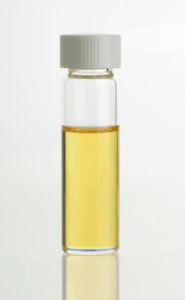← Continued from Essential Oils 101
What Can Essential Oils Do?

Celery Seed Essential Oil
Despite my cautions above, essential oils can be used safely by most people, if used correctly, in highly diluted form. Depending on the specific oil, properly used essential oils can kill bacteria and fungus, soothe, reduce appetite, aid breathing, reduce coughing, and more. Each essential oil has different properties, which you can find with a quick Google search.
How Can I Use Essential Oils Safely?
Before using any essential oil, research it to make sure it is safe for you. Research how it is typically used, whether inhaled as aromatherapy or diluted and applied to the skin. Find out if you have any conditions that would contraindicate its use. Find out what concentrations are used. Every oil will be different. Be wary of any topical preparation that calls for more than five drops unless it is an enormous batch. You want essential oil concentration at no more than 3-5%, though less will still have effects. For infants, 0.25% maximum concentration is recommended. Because massage oils are used over a large portion of the body, a maximum of 1% concentration is recommended for adults, with a much lower concentration recommended for kids. A carrier oil or blend of carrier oils will make up the rest of the massage oil. This is the total concentration of *all* essential oils, not the concentration of each essential oil. Avoid adding more than about 10-20 drops to a heavily diluted cleaning solution. Use common sense. Don’t use essential oils internally, whether ingested or inserted.
Whatever essential oils you choose, use only one at a time to start. Note any effects. Use it consistently for a week or so to be sure it’s safe for you. Stop using it if you experience any negative side effects. You can add a new oil the next week if you wish.
Essential oils are NOT safe for internal use. Period. Not inserted, not ingested, not injected. Some vendors list their essential oils as food grade, but none of them should actually be used in food or as food, or in any other way inside the body, unless specifically prescribed by a doctor and used as prescribed, which is not likely to happen by a qualified MD in North America. The conscientious and reputable essential oil manufacturers and vendors will tell you this. You want thyme flavour in your soup? Add thyme from your spice rack. Want lemon-flavoured candies? Add lemon juice or powdered lemon. Don’t ingest essential oils. Just don’t. Some essential oils can be toxic to the liver or kidneys, some can break down and change their effects in the body, and many oils can interact or interfere with drugs you’re taking. “Therapeutic use” is an uncontrolled (not regulated) term and means that something is meant for use outside of the body. “Clinical grade,” and “aromatherapy grade” don’t tell us much either, other than saying that the oil is pure, as it’s meant to be.

Jojoba Tree
What is a Carrier Oil?
A carrier oil is a base oil, or vegetable-based oil, used to dilute essential oils or other compounds for application to the body. Carrier oils can include coconut oil, olive oil, rice bran oil, sunflower seed oil, apricot kernel oil, hemp oil, and more than I can possibly list here. My favourites are jojoba oil (technically a liquid wax) and red raspberry seed oil.
How Can I Choose the Right Essential Oils to Use?
The first step in choosing an essential oil for any sensitive individuals should be to figure out if the oil contains any allergens to which you’re sensitive (see Essential Oils 101). If you are choosing the oil merely for scent, make sure the oil doesn’t have any negative effects associated with its use in aromatherapy. If you are applying the oil topically (diluted), choose an oil which has the properties you desire. This website should give you a good guide: Essential Oils Uses Chart. Watch for any contraindications.

Aromatic Wood Essential Oil by THANN
Another (much less scientific) method for choosing aromatherapy essential oils based on body chemistry is to smell the oil from a distance and see whether it makes you feel just slightly weaker or not (weak feelings supposedly mean the oil isn’t for you). I found this a few years ago, and for the sake of science, I tried this once. I did find that some oils made me feel less well, but that says nothing about whether it’s the right oil for the job or whether I’m allergic. I wouldn’t recommend this method. Please don’t rely on this.
I hope this information, and that contained in Essential Oils 101 have given you a good basis upon which to decide whether to use essential oils and how you will use them. Essential oils can be wonderful things if used correctly, and knowledge is key to safety and good choices.
